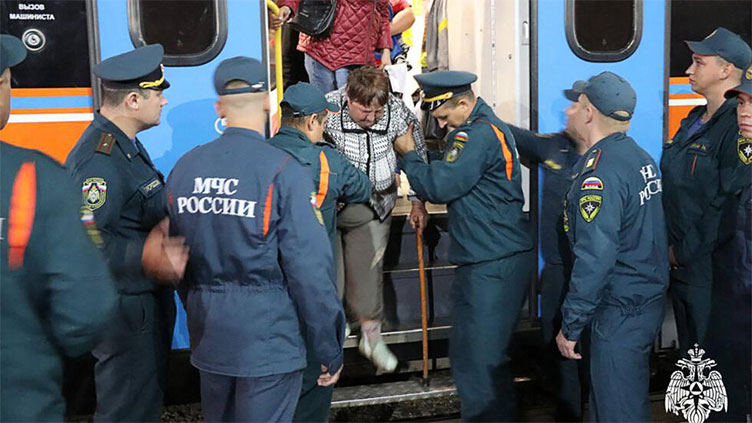Russia evacuates 121,000 people from Kursk region as Ukraine advances

World
Russia continued evacuating residents from the Kursk region near the border with Ukraine.
MOSCOW (Reuters) - Russia continued evacuating residents from the Kursk region near the border with Ukraine on Monday, with the regional governor saying some 121,000 people had already left.
Regional Governor Alexei Smirnov told Putin during a video conference with governors of affected regions that "as of today 121,000 people have left and been evacuated".
Russian officials are evacuating residents from another district in the Kursk border region and have begun evacuations in neighbouring Belgorod, the governors of both regions said Monday as Russian forces battled a Ukrainian incursion for a seventh day.
Ukrainian forces rammed through the Russian border last Tuesday and swept across some Western parts of Russia's Kursk region, a surprise attack that may be aimed at gaining leverage in possible ceasefire talks after the US election.
Apparently caught by surprise, Russia by Sunday had stabilised the front in the Kursk region, though Ukraine had carved out a sliver of Russian territory where battles were continuing on Monday, according to Russian war bloggers.
"About the situation in the Belovsky district: The regional command centre has decided to evacuate residents," Kursk Governor Alexei Smirnov said on social media, referring to an area with a population of over 14,000 people.
In the neighbouring Belgorod region to the south, regional governor Vyacheslav Gladkov said evacuations had begun from the Krasnaya Yaruga District due to "enemy activity on the border".
"I am sure that our servicemen will do everything to cope with the threat that has arisen," Gladkov said. "We are starting to move people who live in the Krasnaya Yaruga district to safer places."
Russia has imposed a tight security regime in the Kursk, Bryansk and Belgorod regions while its ally Belarus said it was bolstering its troop numbers at its border after Minsk said Ukraine had violated its airspace with drones.
Russia invaded Ukraine in February 2022 in what the Kremlin calls a "special military operation" and now controls 18% of Ukrainian territory. Russian forces, which have a vast numerical supremacy, have been advancing this year along the 1,000km (620-mile) front after the failure of Ukraine's 2023 counteroffensive to make any major gains.
Kyiv broke its silence on the attacks on Saturday when President Volodymyr Zelensky said Ukraine had launched an incursion into Russian territory to "restore justice" and pressure Moscow's forces.
INTENSE LAND WAR
Russia destroyed five drones over Belgorod overnight, 11 over Kursk and two over Voronezh, according to Russia's defence ministry, which said it was repelling Ukrainian attacks inside Russia. It listed considerable heavy weaponry including tanks which it said it had destroyed.
The Ukrainian attack has prompted some in Moscow to question why Ukraine was able to pierce the Kursk region so easily after more than two years of the most intense land war in Europe since World War II.
Russian war bloggers said Ukrainian forces in Kursk were trying to encircle Sudzha, where Russian natural gas flows into Ukraine, while major battles were underway near Korenevo, about 22km (14 miles) from the border.
Russia's Gazprom said it would send 39.6 million cubic metres of gas to Europe via Ukraine on Monday.
Moscow said a missile attack on Kursk over the weekend had injured 13 people.
Though the United States said it had not been told of the Ukrainian operation before it was unleashed, there were signs in Moscow that the attack would provoke a response from Russia.
"We have no doubt that the organisers and perpetrators of these crimes, including their foreign curators, will bear responsibility for them," said Maria Zakharova, spokeswoman for the Russian Foreign Ministry.
"A tough response from the Russian Armed Forces will not take long."
At the Zaporizhzhia nuclear power plant, in a part of Ukraine controlled by Russian forces, a major fire broke out.
"These reckless attacks endanger nuclear safety at the plant and increase the risk of a nuclear accident. They must stop now," International Atomic Energy Agency chief Rafael Grossi said in a statement, without attributing blame for the attack.
The Russian operator of the plant said Ukraine had caused the fire with a military strike but that the reactors were in cold shutdown. Zelensky accused Russia of lighting the fire.


